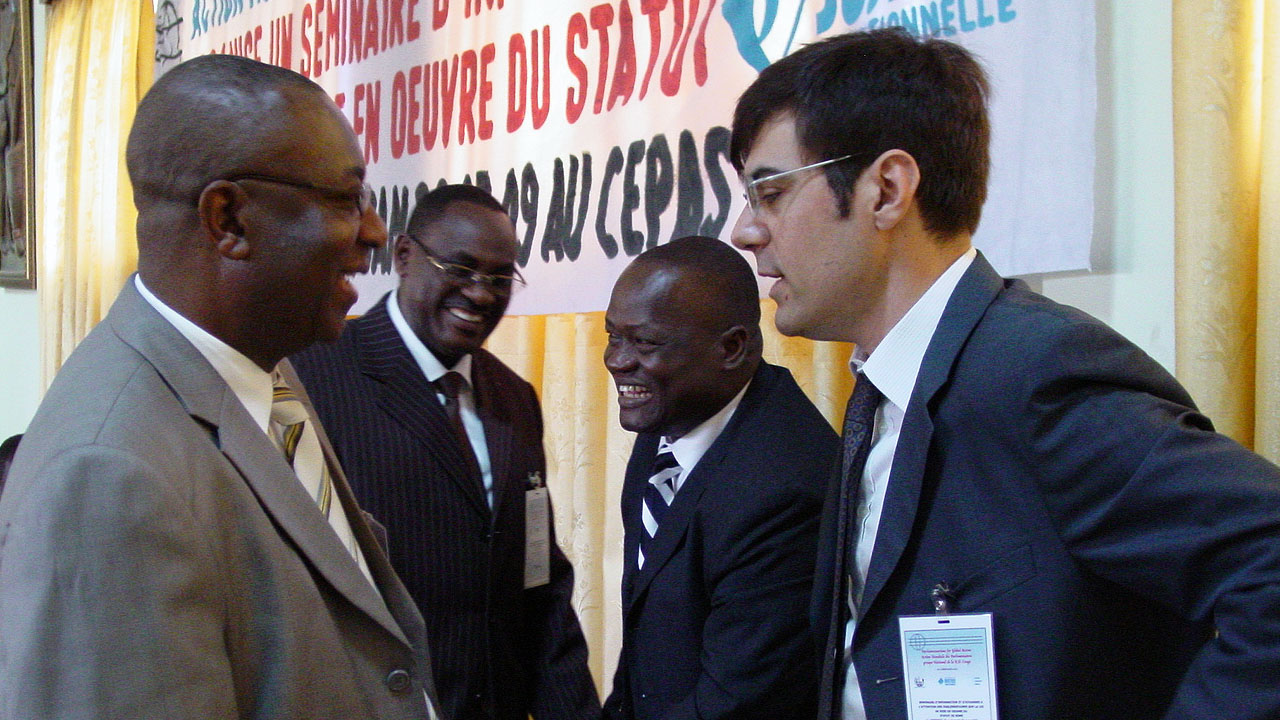
March 27-28, 2009 | Kinshasa
Over 70 Members of the Parliament of the Democratic Republic of the Congo (DRC), Judges and Lawyers, along with a representative of the DRC Ministry of Justice and the spokesperson in the DRC of the International Criminal Court (ICC), actively participated in the Seminar of Parliamentarians for Global Action (PGA) on the national implementation of the Rome Statute of the ICC.
The seminar benefited from a wide participation of various stakeholders, local NGOs led by LIPADHO (League for Peace and Human Rights) and lawyers who are representing victims of crimes against humanity and war crimes in the first ICC trial against Thomas Lubanga.
PGA Members Senator Alain Destexhe (Belgium), Member of the PGA Executive Committee, Mr. Jules Mbaigoto Tatoloumel, MP (Chad), Chair of the Committee on Jurisdictional Affairs and Legislation, and Mr. Fidele Mbunde, MP (Burundi), Chair of the Committee on Justice and Human Rights, shared their experiences with the Congolese MPs and ensured that the issue of National implementation of the Rome Statute will be urgently considered by their respective Parliaments.
The seminar was closed with a clear commitment to promptly adopt the comprehensive legislation that implements the Rome Statute, namely, the Draft ICC Bill tabled by PGA Members Prof. Nyabirungu mwene Songa, MP, and Mr. Crispin Mutumbe Mbuya, MP.
The Chair of the PGA DRC National Group, Mr. Emmanuel Adubango Ali, MP, announced that the Legislation has been included in the Calendar of the Proceedings of the current session of Parliament, which started in mid-March 2009. However, due to the political uncertainties prevailing in the Congolese Parliament at the moment - on March 25, the Speaker and the entire Presidency of the Parliament Lower House presented their resignation - the treatment of the Draft ICC Bill may be postponed to later this year.
The Seminar was organized in collaboration with the Kinshasa offices of Avocats sans Frontieres (ASF), the International Centre for Transitional Justice (ICTJ) and the Konrad Adenauer Foundation, and received the support of the European Commission and the Governments of Belgium, The Netherlands and Switzerland.
Background Information
The Democratic Republic of the Congo (DRC) ratified the Rome Statute, the founding instrument of the International Criminal Court, on 11 April 2002. As a monist State, the act of ratifying immediately incorporated the Rome Statute into the Congolese national law. Nevertheless, the need for a harmonization of law is essential as the current Penal Code and Criminal Procedure Codes, as well as the Codes of Military Justice, have several insufficiencies.
To date, the Congolese Military Courts are the only jurisdictions authorised to treat international crimes and have thus enlarged their competences to non-military cases. Not only do the Military Courts still apply the death penalty, which is not provided for in the Rome Statute, but also are they subject to military discipline and thus exposed to politico-military hierarchy, which has implications on the independence of the judiciary and on the (too often insufficient) protection for victims and witnesses of Rome Statute crimes.
Even if the Military Penal Code of the DRC provides for the war crimes, relevant penalties are not defined. Moreover, the current legislation does not contain provisions on defenses and exoneration and on the principle of individual criminal responsibility. In order to guarantee a fair and impartial trial and ensure respect of the rights of the accused and the victim, a legislation implementing the Rome Statute is therefore of utmost importance.
Already in October 2005, a first Draft ICC bill has been submitted to the Transitional Assembly but has never been discussed in the National Assembly elected at the end of 2006.
